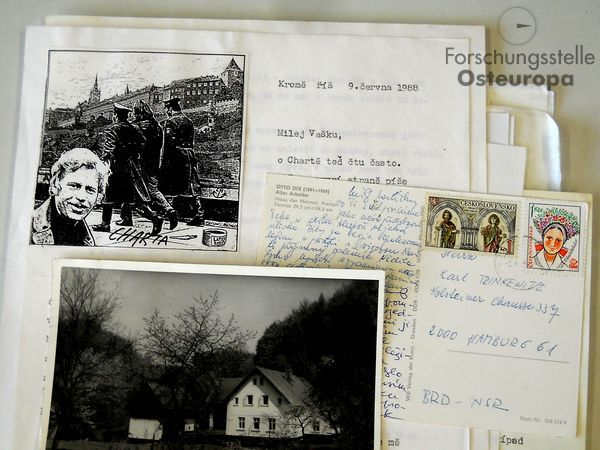Odesa-Tage 2025
Kolloquiumsvortrag
18:15 Uhr, / Zoom
Eka Tchkoidze (Halle) | Medieval History in Georgian Literature and Film (19 th -20th ct.). Some Aspects of Shaping Georgian National Identity
Discussion, 02.12.2025, 18:00, EuropaPunkt
"Occupation, torture, and violations of nuclear safety", with Rebecca Harms (former MEP), Roman Koval (Truth Hounds) and Yana Lysenko (FSO Bremen). Moderated by Eduard Klein (FSO Bremen).
Wissenswertes
Czech Dream Book of 1988
A Letter from Karel Trinkewitz to Václav Havel. Commemorating the 50th Anniversary of the Prague Spring

Quelle: Archiv der Forschungsstelle Osteuropa, FSO 2-060, Karel Trinkewitz, Correspondence (with Václav Havel)
After writing about the dream in detail and trying to make sense of this strange constellation of images, Trinkewitz reminded his correspondent Havel of two books concerning dreams. One was Italian author Luigi Malerba’s “Diary of a Dreamer”, and the other was their fellow Czech writer Ludvík Vaculík’s “Český snář (Czech Dream book).” Both authors described their dreams on February 9th, 1979. Intriguingly, in both cases, the authors described scenes of violence caused by Russian officers in their dreams. Trinkewitz identified these two dreams with his latest one. It was, in his words, “a European dream” in criticizing Russian hegemony in Europe. The artist thought the region was largely threatened by the existence of Russia/the Soviet Union and that ordinary citizens’ lives were at stake. Trinkewitz asked Havel to tell Vaculík about his dream, which he thought of as his version of “Czech Dream book of 1988” and that resonated with the idea of a dream experimentally capturing fragments of contemporary memory.
Trinkewitz’ letter highlights the complexity of political consciousness combined with personal reflections around the late Communist period. The Prague Spring, in this context, appeared to have a long-standing psychological effect on the artist. However, what Trinkewitz anticipated—another Soviet invasion of Prague—did not occur. This was precisely thanks to those who did not give up the hope in the legacy of the protests of 1968—freedom of thought and expression, and the autonomy of Czechoslovakian society. One year after the letter was written, the country experienced a democratic transformation, and the artist even saw the collapse of the Soviet Union in 1991.
Lesetipps:
Klára Burianová: Karel Trinkewitz - O životě, Praha 2016.
Länder-Analysen
» Länder-Analysen
» Eastern Europe - Analytical Digests
Discuss Data
Archiving, sharing and discussing research data on Eastern Europe, South Caucasus and Central AsiaOnline-Dossiers zu
» Erdgashandel
» Hier spricht das Archiv
» Russian street art against war
» Dissens in der UdSSR
» Duma-Debatten
» 20 Jahre Putin
» Protest in Russland
» Annexion der Krim
» sowjetischem Truppenabzug aus der DDR
» Mauerfall 1989

